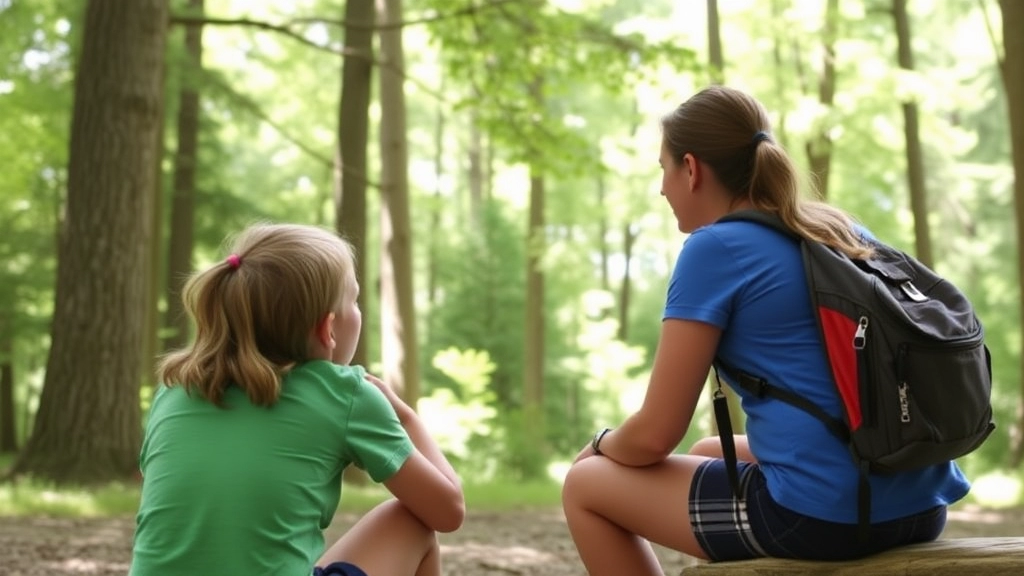Summer Camp Counselors: Their Role and Impact
Ever wondered what do summer camp counselors do and why their role is so crucial? As someone who has been in the trenches, let me take you through the multifaceted responsibilities and the profound impact counselors have on campers. From ensuring safety to leading activities, counselors are the backbone of any successful camp experience.
In this article, we’ll explore the key responsibilities of summer camp counselors, the essential skills they need, and how they foster camper development. We’ll delve into their role in providing emotional support, teaching outdoor skills, and handling real-time challenges. By the end, you’ll see why being a summer camp counselor is not just a job—it’s a transformative experience for both counselors and campers alike.
The Role of a Summer Camp Counselor
Ever wondered what it’s like to be a summer camp counselor? Maybe you’re curious if it’s the right gig for you? Let’s dive into it.
Being a summer camp counselor is more than just a job; it’s a chance to make a real impact on kids’ lives. You’re not just there to supervise; you’re there to inspire, mentor, and lead. It’s about creating unforgettable memories and fostering a safe, fun environment where campers can grow and thrive.
What Does a Summer Camp Counselor Do?
First off, let’s talk basics. As a summer camp counselor, you’re the go-to person for campers. They look up to you, rely on you, and learn from you. Your role is multifaceted, including:
- Supervision: Keeping an eye on campers to ensure they’re safe and following camp rules.
- Activity Leader: Running and organising both recreational and educational activities.
- Mentorship: Providing emotional support and guidance to help campers navigate challenges.
- Safety Officer: Being prepared to handle emergencies and administer first aid when necessary.
Why Is This Role Important?
Think about it: parents are trusting you with their kids. That’s a big deal. Your actions and decisions directly impact the campers’ experience. You’re shaping their summer, and possibly their future. The role is significant because:
- You’re a Role Model: Kids mimic what they see. Your behaviour, attitude, and actions set the tone.
- You Build Confidence: Through activities and encouragement, you help campers develop self-esteem.
- You Teach Life Skills: From teamwork to problem-solving, the skills learned at camp last a lifetime.
Real Stories, Real Impact
Let me share a quick story. Last summer, I had a camper named Jake. Shy, introverted, and hesitant to join activities. By the end of the camp, he was leading his team in a scavenger hunt, beaming with confidence. That’s the power of being a summer camp counselor.
The Bottom Line
Being a summer camp counselor is challenging but incredibly rewarding. You’re not just filling a position; you’re making a difference. So, if you’re ready to take on a role that’s both fun and impactful, this might just be the job for you.
For more tips on how to excel in this role, check out our Engaging Summer Camp Curriculum Guide. And if you’re still considering whether this is the right fit for you, our guide on summer camp costs might help you make an informed decision.
Key Responsibilities of Summer Camp Counselors

Ever wondered what it’s really like to be a summer camp counselor?
I get it.
You’ve got questions, and you need answers.
Let’s dive in.
What Do Summer Camp Counselors Actually Do?
You might think it’s all fun and games.
Well, it is—partly.
But there’s so much more.
Here’s the lowdown:
- Supervision: Keeping an eye on campers 24/7. Safety first.
- Activity Planning: Crafting schedules packed with fun and learning.
- Role Model: Being someone campers look up to. No pressure, right?
- Conflict Resolution: Handling squabbles like a pro. Think of it as diplomacy for kids.
- Communication: Keeping parents and staff in the loop.
The Nitty-Gritty of Daily Tasks
You’re not just there to have a good time.
There are real responsibilities:
- Morning Routines: Getting everyone up and ready. Yes, even the grumpy ones.
- Meal Times: Ensuring everyone eats well and behaves. Food fights? Not on your watch.
- Activity Supervision: From arts and crafts to sports, you’re the go-to person.
- Evening Wind-Down: Helping campers settle in for the night. Storytime, anyone?
- Health Checks: Keeping tabs on any bumps, scrapes, or illnesses.
Real Stories From the Trenches
Let me tell you about Sarah.
She was a first-time counselor, nervous as heck.
One day, a camper got homesick.
Tears and all.
Sarah took her aside, shared her own stories of missing home, and voila!
The camper felt better.
It’s these moments that make the job worth it.
Why These Responsibilities Matter
You’re shaping lives here.
No joke.
Every activity, every conversation, every conflict resolved—it all adds up.
You’re not just a camp counselor.
You’re a mentor, a leader, a friend.
Safety and Supervision of Campers
Ever worried about keeping a bunch of kids safe at camp? Well, you’re not alone. Safety and supervision are the bedrock of any successful summer camp experience. Let’s break this down so it’s as clear as a sunny day at camp.
Why Safety Matters
First things first, safety is the top priority. When parents drop their kids off at camp, they’re trusting usâyes, you and meâto keep their little ones out of harm’s way. It’s not just about avoiding injuries; it’s about creating an environment where campers feel secure and can thrive.
Key Components of Supervision
Supervision isn’t just about keeping an eye on the kids. It’s a multi-layered task that involves:
- Constant Vigilance: Always be aware of where your campers are and what they’re doing. Keep a headcount and know the layout of the camp like the back of your hand.
- Proactive Monitoring: Spot potential hazards before they become problems. Is there a slippery spot near the pool? Get it fixed or cordoned off.
- Engagement: Interact with the kids. The more engaged you are, the less likely they are to get into trouble.
Practical Tips for Effective Supervision
Here’s a quick list of actionable tips to make sure you’re on top of your game:
- Buddy System: Pair up campers so they always have someone looking out for them.
- Regular Check-ins: Set specific times for headcounts and check-ins throughout the day.
- Clear Rules: Make sure campers know the rules and understand why they’re important.
- Emergency Drills: Practice what to do in case of an emergency. Make it a fun, engaging activity so they remember it.
Real-World Example
Let me share a quick story. Last summer, one of my campers, Timmy, wandered off during a nature hike. Panic mode, right? But because we had the buddy system in place, his buddy immediately alerted me. We found Timmy within minutes, happily examining a butterfly. That’s the power of proactive supervision.
Making Safety Fun
Safety doesn’t have to be boring. Turn it into a game! Create a scavenger hunt that includes spotting potential hazards or have a competition on who can come up with the best safety tips. Engage the campers in their own safety.
In the end, safety and supervision are all about balance. Be vigilant but not overbearing. Keep it fun but always stay alert. Remember, the goal is to create a safe space where campers can explore, learn, and grow. When you nail this, you’re not just a camp counselorâyou’re a hero in the eyes of your campers and their parents.
Looking for more tips on being an epic camp counselor? Check out our sections on Essential Skills for Summer Camp Counselors and Leading Recreational and Educational Activities.
Leading Recreational and Educational Activities
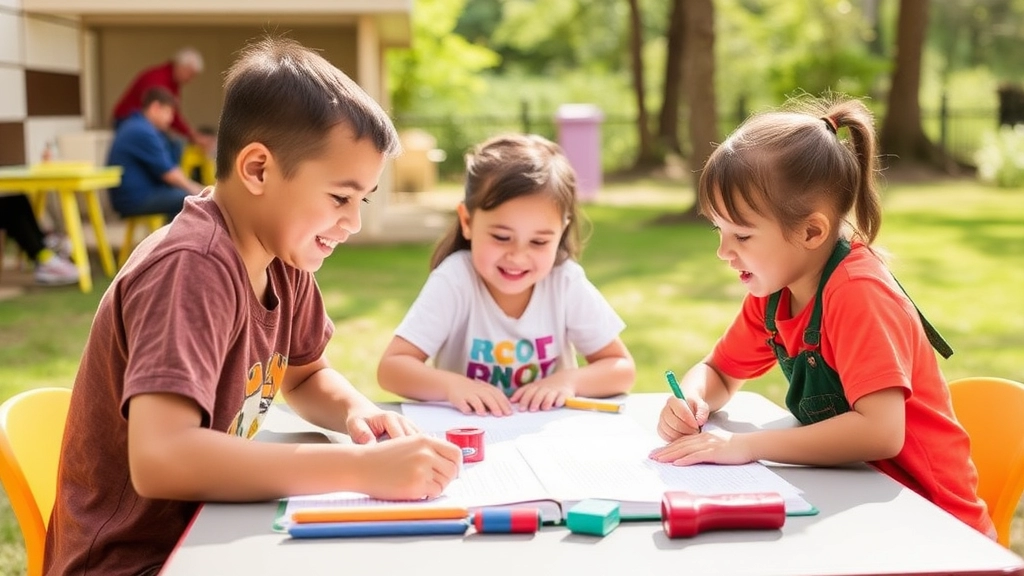
Ever wonder what it’s like to lead a bunch of excited kids through a day of camp activities?
It’s a mix of fun, chaos, and a whole lot of learning.
As a summer camp counselor, you’re not just a babysitter.
You’re the one making sure these kids have the time of their lives while picking up some valuable skills along the way.
Why Leading Activities Matters
The keyword here is “leading recreational and educational activities.”
It’s the heart of your role.
You’ve got to keep things fresh, engaging, and safe.
Kids come to camp to have fun, but they also leave with new knowledge and experiences.
Types of Activities You’ll Lead
You’ll be juggling a variety of activities, each with its own set of challenges and rewards.
Here’s a breakdown:
- Sports and Games: Think football, capture the flag, and even some good old-fashioned tug-of-war.
- Arts and Crafts: From painting to making friendship bracelets, you’ll unleash their creative side.
- Nature Walks: Teach them about local flora and fauna. It’s like a mini biology lesson in the wild.
- STEM Activities: Simple science experiments and engineering challenges that make learning fun.
- Team-Building Exercises: Activities that promote cooperation and teamwork, like trust falls or obstacle courses.
How to Keep Activities Engaging
Keeping kids engaged isn’t rocket science, but it does take some effort.
Here’s what I’ve found works best:
- Variety: Mix it up. Don’t let them get bored by doing the same thing every day.
- Energy: Your enthusiasm is contagious. If you’re excited, they will be too.
- Flexibility: Be ready to adapt. Sometimes things don’t go as planned, and that’s okay.
- Participation: Get involved. Don’t just supervise—play the games, make the crafts, join the fun.
Real Talk: Challenges You’ll Face
Let’s be real.
Not every activity will go smoothly.
You’ll face challenges like:
- Short Attention Spans: Kids can get distracted easily. Keep activities short and sweet.
- Different Skill Levels: Not every child will be at the same level. Find ways to include everyone.
- Safety Concerns: Always prioritize safety. Have a plan for emergencies and know the risks.
The Reward
When you see a kid light up because they’ve just scored their first goal or finished a craft they’re proud of, it’s all worth it.
Leading recreational and educational activities isn’t just about filling time.
It’s about creating memories and teaching life skills.
And trust me, the kids will remember you for it.
Essential Skills for Summer Camp Counselors
Ever wondered what it takes to be a top-notch summer camp counselor? You’re not alone. Many aspiring counselors have the same burning question: What skills do I need to make it through the summer and leave a lasting impact on my campers? Let’s break it down.
Communication Skills
First things first, communication is king. If you can’t clearly and effectively communicate with your campers, fellow counselors, and camp directors, you’re in for a rough ride. Here’s what you need:
- Active listening: Pay attention to what campers are saying. Sometimes, their words hide deeper concerns.
- Clear instructions: Whether you’re leading a hike or explaining a craft, clarity is key.
- Positive reinforcement: Encourage and motivate campers with positive feedback.
Leadership Abilities
Being a camp counselor means you’re a leader. No way around it. You need to:
- Set the tone: Your energy and attitude will be contagious. Bring the good vibes.
- Decision-making: Be ready to make quick decisions, especially in unexpected situations.
- Conflict resolution: Campers will bicker. It’s inevitable. Your job is to mediate and resolve conflicts smoothly.
Patience and Adaptability
Things rarely go as planned. Patience and adaptability are your best friends.
- Stay calm under pressure: Whether a camper is having a meltdown or a storm cancels your outdoor plans, keep your cool.
- Flexibility: Be ready to pivot. Activities might change, and you’ll need to adapt on the fly.
Teamwork
You’re not in this alone. Teamwork is essential.
- Collaborate: Work closely with other counselors to ensure activities run smoothly.
- Support: Lend a hand when a fellow counselor needs it. Team effort makes the dream work.
- Share ideas: Brainstorming with others can lead to some epic activities and solutions.
Problem-Solving Skills
Real-time problem-solving is a must. Camp life is unpredictable.
- Think on your feet: Quick thinking can turn potential disasters into memorable experiences.
- Resourcefulness: Use what you have to solve problems. Sometimes, creativity is your best tool.
- Proactive approach: Anticipate issues before they arise and have backup plans ready.
Emotional Intelligence
Emotional intelligence is crucial. You’re not just a supervisor; you’re a mentor and a friend.
- Empathy: Understand and share the feelings of your campers.
- Support: Be there for campers who are homesick or struggling emotionally.
- Encouragement: Help campers build confidence and self-esteem.
Outdoor and Survival Skills
Lastly, some solid outdoor and survival skills are a big plus.
- Safety first: Know basic first aid and emergency procedures.
- Navigation: Be able to lead hikes and outdoor activities safely.
- Nature knowledge: Teach campers about the environment and how to respect it.
Being a summer camp counselor isn’t just about having fun (though there’s plenty of that). It’s about developing a unique set of skills that help you guide, support, and inspire campers. By honing these essential skills, you’re not just preparing for a summer jobâyou’re gearing up for a role that can make a real difference in young lives. So, are you ready to dive in?
For more tips on preparing for camp, check out our Summer Camp Packing List for Counselors and discover the Creative Names for a Summer Camp to make your camp experience unforgettable.
Developing Leadership and Teamwork at Camp
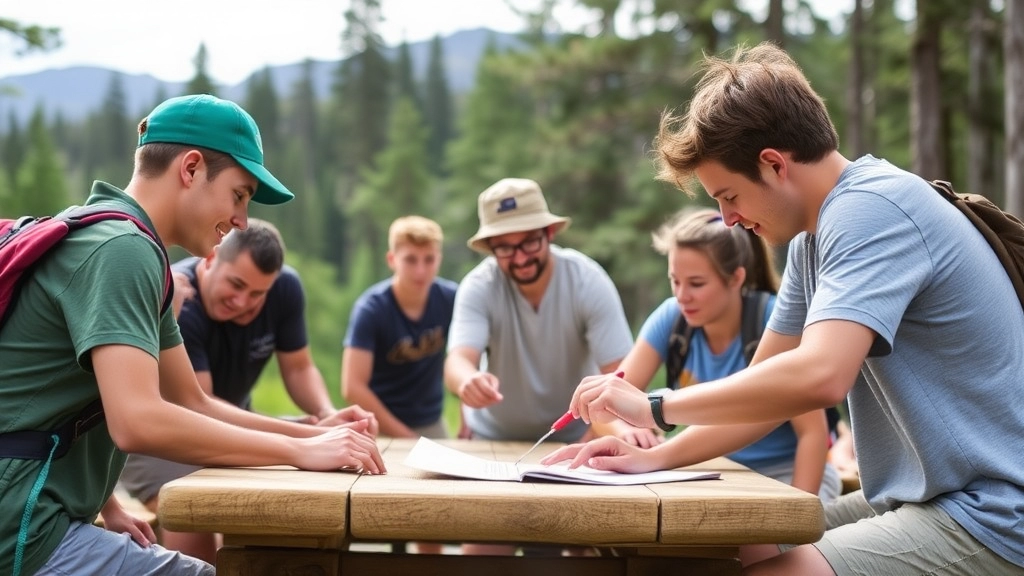
Ever wonder how you can become a better leader? Or how to make a group of kids work together like a well-oiled machine?
Being a summer camp counselor is your golden ticket.
Leadership and teamwork are the bread and butter of camp life.
Let’s break it down.
Why Leadership Matters
You’re not just a babysitter. You’re a role model.
Kids look up to you. They mimic your behaviour.
So, how do you lead effectively?
- Lead by Example: Show up on time, stay positive, and be respectful.
- Communicate Clearly: Kids need clear instructions. No room for ambiguity.
- Stay Calm Under Pressure: When things go sideways, and they will, keep your cool.
Building Teamwork
Camp isn’t just about individual growth. It’s about learning to work as a team.
Here’s how you can foster teamwork:
- Team-Building Activities: Think obstacle courses, trust falls, and group challenges.
- Encourage Collaboration: Pair up kids for tasks. Make them rely on each other.
- Celebrate Wins Together: Whether it’s winning a game or completing a task, celebrate as a team.
Real-Life Example
Remember that time when the camp’s flag went missing?
Instead of freaking out, you rallied the kids to search for it. You divided them into teams, each with a specific area to cover.
Not only did you find the flag, but you also taught the kids the value of teamwork.
Quick Tips for Developing Leadership and Teamwork
- Set Clear Goals: Let kids know what they’re working towards.
- Be Approachable: Kids should feel comfortable coming to you with problems.
- Give Constructive Feedback: Praise effort, correct mistakes gently.
The Impact
By focusing on leadership and teamwork, you’re not just making camp fun.
You’re equipping kids with skills they’ll use for life.
So, next time you’re at camp, remember: You’re not just a counselor.
You’re a leader, a mentor, and a team builder.
And that’s pretty damn cool.
Ready to Lead?
Leadership and teamwork aren’t just buzzwords. They’re the core of what makes a camp experience unforgettable.
So, step up.
Be the leader these kids need.
And watch them grow into leaders themselves.
Handling Challenges and Problem-Solving in Real-Time
Ever had those moments where everything seems to go haywire all at once? That’s pretty much a day in the life of a summer camp counselor. Handling challenges and problem-solving in real-time is not just a part of the job; it’s the core of it. So, how do we keep things running smoothly when chaos hits?
First off, let’s break down the common challenges:
- Camper Conflicts: Kids argue. It’s inevitable. Whether it’s over who gets the last marshmallow or who’s the strongest during tug-of-war, disputes happen.
- Weather Issues: Mother Nature can be unpredictable. One minute it’s sunny, the next, it’s pouring rain.
- Health Emergencies: From minor scrapes to more serious injuries, health issues can pop up unexpectedly.
- Activity Failures: Sometimes, the meticulously planned scavenger hunt just doesn’t engage the kids as you hoped.
So, how do you tackle these head-on? Here’s the lowdown:
- Stay Cool and Collected: Panicking never solves anything. Keep a level head, even when the kids are losing theirs. Your calmness is contagious.
- Quick Decision-Making: Sometimes, you’ve got seconds to make a call. Trust your gut, but also lean on your training.
- Communication is Key: Keep an open line with your co-counselors and the camp director. A quick heads-up can prevent small issues from snowballing.
- Conflict Resolution Skills: When campers clash, listen to both sides. Encourage them to express their feelings and guide them towards a compromise.
- Backup Plans: Always have a Plan B (and C). If the weather turns, have indoor activities ready. If an activity flops, switch gears fast.
- First Aid Knowledge: Knowing basic first aid can turn a scary situation into a manageable one. Always keep your kit handy and know your procedures.
A Real-World Example:
Let me tell you about the time we had a massive thunderstorm roll in during our big outdoor relay race. Panic mode? Not quite. We quickly gathered the kids, moved them to the main hall, and turned the relay into an indoor obstacle course. The kids loved it, and we kept the energy high despite the weather.
Key Takeaways:
- Adaptability: The ability to pivot quickly is crucial.
- Empathy: Understanding and addressing the emotional needs of campers can defuse tense situations.
- Resourcefulness: Sometimes, you’ve got to MacGyver your way through problems with whatever’s on hand.
For more tips on handling common camp scenarios, check out our 2024 Summer Camp Guide.
Emotional Support and Mentorship for Campers
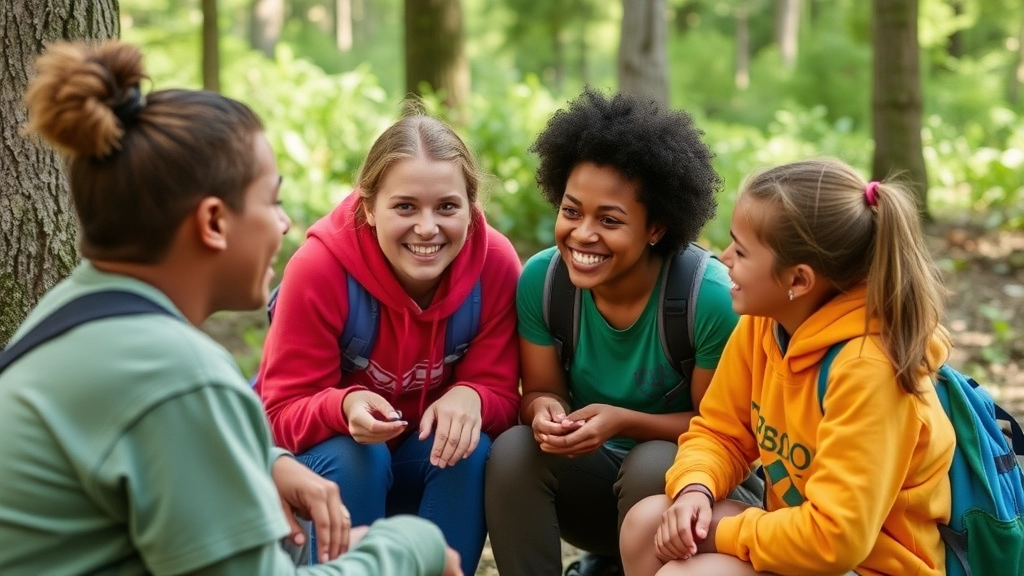
Ever worried about how to connect with campers on an emotional level?
Or how to be that mentor they look up to?
Trust me, I’ve been there.
Being a summer camp counsellor isn’t just about fun and games.
It’s about being a rock for these kids.
It’s about providing emotional support and mentorship that can make a lasting impact.
Why Emotional Support Matters
Kids come to camp with all sorts of backgrounds.
Some are confident.
Some are shy.
And some are dealing with stuff you wouldn’t believe.
Your job?
Be their anchor.
Make them feel safe and understood.
How to Provide Emotional Support
So, how do you do that?
Here are a few pointers:
- Listen Actively: When a camper talks, really listen. Nod, make eye contact, and show you care.
- Be Approachable: Smile often. Be open. Let them know you’re there for them.
- Empathise: Put yourself in their shoes. Understand their feelings and validate them.
Mentorship: More Than Just Guidance
Mentorship goes beyond just giving advice.
It’s about being a role model.
It’s about showing them the ropes and helping them grow.
Tips for Effective Mentorship
- Lead by Example: Kids watch what you do more than they listen to what you say. Be the person you want them to become.
- Encourage: Praise their efforts, not just their successes. Build their confidence.
- Share Stories: Got a personal story that relates to their struggles? Share it. It makes you relatable and human.
Real-Life Example
I remember a camper named Jake.
He was super shy and kept to himself.
One day, I noticed he loved drawing.
So, I sat with him and asked about his art.
We bonded over that.
By the end of the camp, he was more open and even made a few friends.
That’s the power of emotional support and mentorship.
The Impact on Camper Development
When you provide emotional support and mentorship, you’re not just helping them get through camp.
You’re giving them tools for life.
They become more resilient.
More confident.
And they carry those lessons with them long after camp is over.
Outdoor and Survival Skills Taught to Campers
Ever wondered what outdoor and survival skills you can teach campers that will keep them engaged and prepared for any adventure? You’re not alone. Many camp counsellors face this challenge, but let’s break it down.
Why Outdoor and Survival Skills Matter
First off, why bother teaching outdoor and survival skills? Simple. These skills are not just cool to know; they build confidence, foster independence, and create a sense of accomplishment. Plus, they’re just plain fun!
Essential Outdoor Skills
Let’s start with the basics. Here are some essential outdoor skills every camper should learn:
- Navigation: Knowing how to read a map and use a compass is crucial. Teach campers how to identify landmarks and use the sun for direction.
- Shelter Building: Show them how to build a basic shelter using natural materials. This is not just a survival skill but also a great team-building activity.
- Fire Starting: Teach the safe way to start a fire, whether it’s with matches, a lighter, or even a flint and steel. Emphasise fire safety and responsibility.
- Knot Tying: Believe it or not, knowing a few basic knots can be incredibly useful. Start with the square knot, bowline, and clove hitch.
Survival Skills for the Real World
Now, let’s dive into some survival skills that are both practical and engaging:
- First Aid Basics: Knowing how to treat minor injuries is a must. Teach campers how to clean wounds, apply bandages, and recognise signs of more serious conditions.
- Water Purification: Show them how to find and purify water. Boiling, using purification tablets, or even a basic filtration system can be lifesavers.
- Foraging: Teach campers how to identify edible plants and berries. Make sure to stress the importance of knowing what’s safe and what’s not.
- Signalling for Help: Whether it’s using a whistle, mirror, or creating ground signals, knowing how to attract attention can be crucial in an emergency.
Real-Life Examples
I remember one summer when a group of campers got lost during a hike. Thanks to their navigation skills, they found their way back to camp safely. Another time, a sudden rainstorm hit, and the kids were able to build a makeshift shelter to stay dry. These are the moments when the skills you teach really pay off.
Making It Fun and Engaging
You might be thinking, “How do I make these skills fun to learn?” Here’s how:
- Challenges and Competitions: Turn skills into games. Who can build the best shelter? Who can start a fire the fastest (safely, of course)?
- Storytelling: Share stories of survival and adventure. Real-life examples make the skills more relatable and memorable.
- Hands-On Practice: The best way to learn is by doing. Get campers involved in hands-on activities and real-life scenarios.
Final Thoughts
Teaching outdoor and survival skills is more than just a camp activity; it’s a way to prepare kids for real-life challenges. It builds resilience, teamwork, and a love for the outdoors. So, next time you’re out in the wild with your campers, remember: these skills are not just lessonsâthey’re life-changing experiences.
For more inspiration, check out our Top 10 Exciting Summer Camp Activities and discover how summer camp life fosters fun, growth, and lifelong bonds.
How Camp Counselors Promote Camper Development
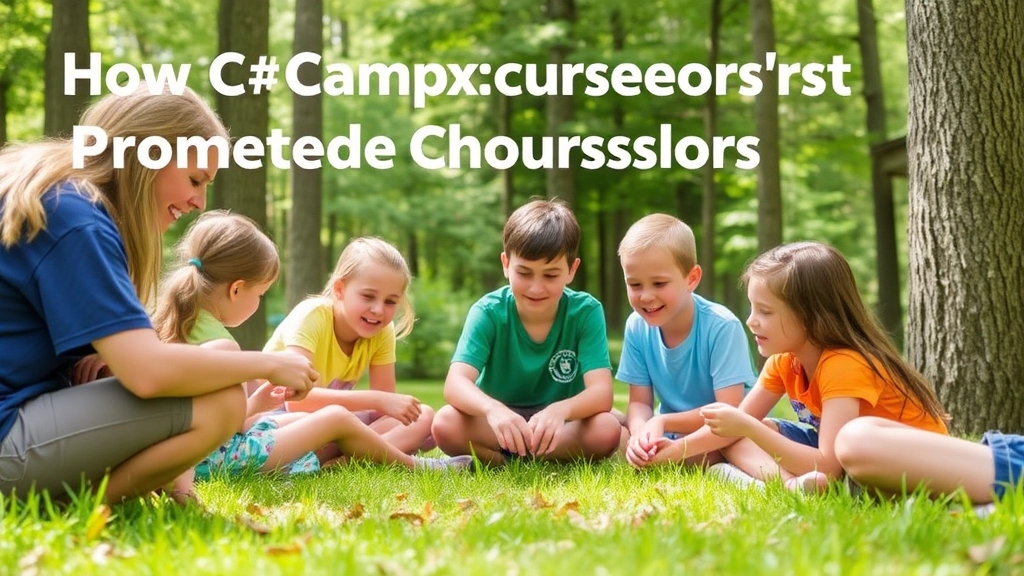
Ever wondered how summer camp can shape your kid into a more confident, capable individual?
As a camp counsellor, I’ve seen it firsthand.
Let’s dive into the nitty-gritty of how we promote camper development.
Building Confidence and Independence
Kids arrive at camp, some shy and unsure.
By the time they leave, they’re often more confident and independent.
How do we pull that off?
- Encouragement: We cheer them on, whether they’re trying archery for the first time or leading a group activity.
- Responsibility: Giving them small roles, like being in charge of the campfire, teaches accountability.
- Problem-Solving: We let them figure out solutions, like setting up their tents or resolving minor conflicts.
Fostering Social Skills
Social skills are huge, right?
At camp, kids are constantly interacting.
Here’s how we make it work:
- Team Activities: Group games and projects force them to communicate and cooperate.
- Mixing Groups: We switch up the groups regularly so they learn to get along with different people.
- Conflict Resolution: When issues arise, we guide them through resolving it constructively.
Encouraging Curiosity and Learning
Camp isn’t just fun and games.
It’s a learning ground.
Here’s what we do:
- Educational Activities: From nature walks to science experiments, we sneak in learning.
- Guest Speakers: We bring in experts to talk about wildlife, astronomy, and more.
- Skill Workshops: Kids can learn new skills, like cooking or coding, in a hands-on environment.
Promoting Physical Fitness
Kids today need more physical activity, right?
Camp is perfect for that.
Here’s how we get them moving:
- Daily Exercises: Morning stretches or yoga sessions.
- Sports and Games: Football, swimming, and other sports keep them active.
- Adventure Activities: Hiking, canoeing, and climbing challenge their physical limits.
Instilling Values and Ethics
Values and ethics are crucial.
Here’s how we instil them:
- Role Models: We lead by example. Kids mimic what they see.
- Storytelling: We share stories that highlight important values.
- Group Discussions: We talk about topics like honesty, respect, and kindness.
Creating a Safe and Supportive Environment
A safe, supportive environment is key.
Here’s our approach:
- Open Communication: We encourage kids to share their thoughts and feelings.
- Observation: We keep a close eye on everyone to spot any issues early.
- Support Systems: We have systems in place for kids to get help when needed.
Requirements to Become a Summer Camp Counselor
Ever wondered what it takes to be a summer camp counselor? Yeah, me too. It’s not just about having fun with kids all day, although that’s a big part of it. There’s a lot more to it, and if you’re thinking about stepping into this role, you need to know the ins and outs. So, let’s break it down.
What Do You Need to Be a Summer Camp Counselor?
First off, what are the basics? Most camps have a few non-negotiables. Here’s a quick rundown:
- Age Requirement: Typically, you need to be at least 18 years old. Some camps might hire 16- or 17-year-olds for junior counselor positions.
- Education: A high school diploma is usually the minimum. Some camps prefer or require college students or graduates.
- Experience with Kids: Whether it’s babysitting, tutoring, or previous camp experience, you need to show you can handle a group of kids.
- Background Check: This is a must. Camps need to ensure the safety of their campers, so a clean background check is essential.
Skills and Certifications
Now, let’s talk skills and certifications. You might be wondering, “Do I need any special training?” The short answer is yes, but it depends on the camp. Here are some common requirements:
- First Aid/CPR Certification: This is crucial. You need to know how to handle emergencies.
- Specialized Skills: Some camps look for counselors with specific talents, like swimming, arts and crafts, or sports coaching.
- Leadership Training: Camps often provide this, but having some prior experience or training can give you a leg up.
The Application Process
So, you’ve got the basics down. What’s next? The application process can be competitive, so here’s how to stand out:
- Craft a Killer Resume: Highlight your experience with kids, any leadership roles, and relevant certifications.
- Write a Compelling Cover Letter: Share your passion for working with kids and why you’re a perfect fit for the camp.
- Ace the Interview: Be ready to discuss your experience, how you handle challenges, and why you want to be a camp counselor.
Real Talk: What Camps Are Looking For
Camps want more than just qualifications. They’re looking for people who can connect with kids and make a positive impact. Think about these qualities:
- Patience and Empathy: Kids can be a handful. You need to stay calm and understand their needs.
- Energy and Enthusiasm: Camps are high-energy environments. You need to bring your A-game every day.
- Problem-Solving Skills: Things don’t always go as planned. Being able to think on your feet is crucial.
My Journey as a Camp Counselor
Let me share a quick story. When I first applied to be a summer camp counselor, I had zero formal experience. But I had tons of babysitting gigs under my belt and a genuine love for working with kids. I made sure to highlight that in my application. During the interview, I shared stories of how I handled tricky situations with kids. It wasn’t just about ticking boxes; it was about showing my passion and commitment. And guess what? I got the job.
First Aid and Emergency Preparedness as a Counselor
Ever worried about what you’d do if a camper got hurt or something went wrong?
You’re not alone.
First aid and emergency preparedness are crucial skills for any summer camp counselor.
Let’s break it down into bite-sized, digestible pieces.
Why First Aid Matters
As a camp counselor, you’re the go-to person for the kids.
They look up to you.
You need to be ready for anything, from scraped knees to more serious injuries.
Knowing first aid isn’t just a nice-to-have; it’s a must.
Essential First Aid Skills
Here are some key skills every camp counselor should master:
- CPR: You never know when you’ll need to revive someone.
- Bandaging: Keep those cuts and scrapes clean and covered.
- Splinting
FAQs About Summer Camp Counselors
What Do Summer Camp Counselors Do?
Summer camp counselors are responsible for supervising campers, planning activities, serving as role models, resolving conflicts, and maintaining communication with parents and staff. They ensure the safety and well-being of the campers while providing a fun and educational experience.
What Are the Daily Tasks of a Summer Camp Counselor?
Daily tasks include managing morning routines, overseeing meal times, supervising activities, helping campers wind down in the evening, and conducting health checks. Counselors are involved in every aspect of the campers’ day to ensure a smooth and enjoyable experience.
What Types of Activities Do Counselors Lead?
Counselors lead a variety of activities such as sports and games, arts and crafts, nature walks, STEM activities, and team-building exercises. These activities are designed to be engaging, educational, and fun for the campers.
How Do Counselors Keep Activities Engaging?
To keep activities engaging, counselors use a mix of variety, energy, flexibility, and participation. They ensure activities are diverse, show enthusiasm, adapt to changing circumstances, and actively participate alongside the campers.
What Challenges Do Counselors Face?
Counselors may face challenges such as managing short attention spans, accommodating different skill levels, and addressing safety concerns. They need to be prepared to adapt and ensure a safe environment for all participants.
Why Is Emotional Support Important at Camp?
Emotional support is crucial because campers come from diverse backgrounds and may face various challenges. Counselors provide a safe and understanding environment, helping campers feel secure and valued.
How Can Counselors Provide Effective Emotional Support?
Counselors can provide emotional support by listening actively, being approachable, and empathizing with campers. They create a supportive atmosphere where campers feel comfortable sharing their thoughts and feelings.
What Is the Role of a Counselor as a Mentor?
As mentors, counselors lead by example, encourage campers, and share personal stories to relate to the campers’ experiences. They guide campers in developing life skills and building confidence.
How Do Counselors Promote Camper Development?
Counselors promote camper development by building confidence and independence, fostering social skills, encouraging curiosity and learning, promoting physical fitness, instilling values and ethics, and creating a safe and supportive environment.
How Do Counselors Foster Leadership and Teamwork?
Counselors foster leadership by leading by example, communicating clearly, and staying calm under pressure. They build teamwork through team-building activities, encouraging collaboration, and celebrating group achievements.
Why Are Leadership and Teamwork Important at Camp?
Leadership and teamwork are essential because they help campers develop skills that are valuable beyond camp. These skills include effective communication, problem-solving, and the ability to work well with others.
What Impact Do Counselors Have on Campers?
Counselors have a significant impact on campers by shaping their experiences and development. They help campers grow into more confident, capable, and resilient individuals who carry the lessons learned at camp into their everyday lives.
References
-
The Role of a Camp Counselor
-
Summer Camp Counselor Job Description
-
Camp Counselor Job Description: Top Duties and Qualifications

